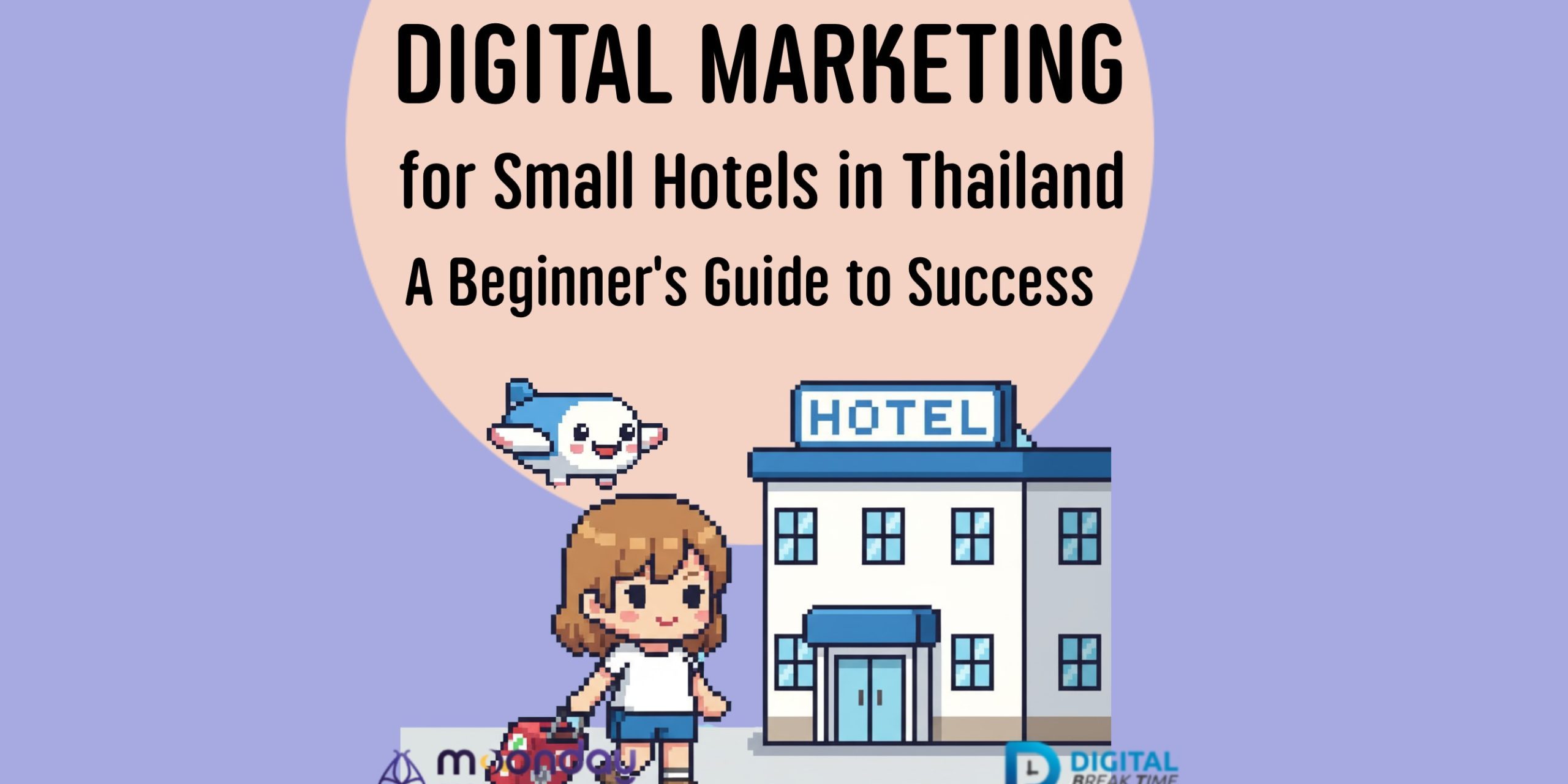In today’s travel landscape, Digital Marketing for Small Hotels is no longer an option—it’s essential. Nearly every traveler begins their journey online, whether they’re searching on Google, browsing platforms like Agoda and Booking.com, or reading reviews on social media. If your hotel isn’t visible in these digital spaces, you’re missing out on a massive audience.
A common concern for small hotel owners is the budget. How can a small establishment compete with large chains that have substantial marketing funds? The answer is simple: you absolutely can. Effective digital marketing doesn’t always require a hefty budget. There are many powerful, low-cost, and even free strategies you can implement.
This guide will walk you through actionable steps that your small hotel in Thailand can take to thrive online.
Digital Marketing for Small Hotels in Thailand: A Beginner’s Guide to Success
Why is Digital Marketing Crucial for Small Hotels in Thailand?
Understanding the “why” is the first step. Here’s what makes a digital presence so important:
- Align with Traveler Behavior: Modern travelers live online. They research, compare, and book accommodations through Google, OTAs, and social media. Being online ensures you’re there when they’re looking.
- Compete with Larger Hotels: While you might not outspend them on ads, you can win guests over with unique content, a strong brand personality, and outstanding service. Digital marketing levels the playing field.
- Increase Profits and Reduce Long-Term Costs: Relying solely on booking platforms and paid ads means constant expenses. A strong website with a direct booking system allows you to increase your profit per room.
- Boost Visibility and Credibility: An online presence makes your hotel look professional and trustworthy, giving potential guests the confidence to book.
- Build Direct Customer Relationships: Channels like social media and email allow you to communicate directly with your guests, encouraging repeat bookings and fostering loyalty.
How to Get Started with Digital Marketing for Your Small Hotel

1. Leverage Online Travel Agencies (OTAs)
For new or small hotels, OTAs are an indispensable first step. Platforms like Agoda, Booking.com, Traveloka, Expedia, and Airbnb are where customers are actively searching for accommodation.
Start by creating a complete and compelling profile. Include detailed descriptions of your rooms, location, and amenities. Most importantly, upload high-quality, professional photos that capture the best aspects of your property.
Consistently update your prices and run promotions to stay competitive. If you have the budget, consider using the platform’s internal advertising features to boost your listing to the top of search results, significantly increasing your chances of getting booked.
2. Create Your Own Hotel Website with a Booking System
While OTAs bring in customers, they also take a commission from every booking. That’s why having your own website is a critical long-term strategy. It allows guests to book directly with you, meaning more profit in your pocket.
Your website should feature:
- Comprehensive details about rooms, pricing, and location.
- Stunning photography.
- An easy-to-use and reliable online booking engine.
- Secure payment options (credit card, bank transfer, QR code).
By driving direct bookings, you build a sustainable customer base and gain more control over your revenue, reducing your dependency on OTAs.
3. Implement SEO to Rank on Google’s First Page
Once you have a website, the next step is helping customers find it. This is where Search Engine Optimization (SEO) comes in. SEO is the process of optimizing your website to rank higher in search results for relevant keywords.
Imagine a traveler searching for “budget hotel near Hua Hin beach” or “charming guesthouse in Chiang Mai.” The higher your website ranks, the more likely they are to click on it.
A great SEO tactic for small hotels is content marketing. Write blog posts on your website that are helpful to travelers, such as:
- “Top 5 Attractions Near Our Hotel”
- “A Guide to Local Cuisine in [Your City]”
- “Itinerary Ideas for a Weekend Getaway”
This type of content not only improves your Google ranking but also showcases the unique experience your hotel offers, turning searchers into guests.
4. Run Targeted Ads to Reach the Right Audience

For a quick boost in bookings, online advertising is a highly effective option.
- Google Ads: Allows your hotel to appear at the top of the search results when people are actively looking for accommodation.
- Facebook & Instagram Ads: Perfect for building brand awareness with visually appealing photos and videos that tell your hotel’s story.
If you’re new to advertising, start with a small budget. Target specific demographics, such as Thai tourists looking for a staycation in Chiang Mai or couples planning a beach holiday. Analyze the results and gradually increase your budget where it’s most effective.
Alternatively, consider hiring a marketing agency that specializes in the hospitality industry. Their expertise can deliver better results faster than going it alone.
5. Use Social Media to Build Awareness and Engagement
Social media platforms like Facebook, Instagram, and TikTok are powerful free tools for small hotels. Use them to tell your story, highlight what makes you unique, and build a community.
Share content like:
- Beautiful photos of your hotel’s best features.
- Reviews and testimonials from happy guests.
- Short video tours of your rooms and facilities.
The key to social media success is consistency. Regular updates keep your hotel top-of-mind. When followers share your content, you gain free exposure to a wider audience.
6. Manage Customer Reviews and Feedback
Reviews are one of the most influential factors in a traveler’s booking decision, especially for smaller, lesser-known hotels. Most people read reviews before they book.
It is crucial to manage your reviews professionally. Respond to both positive and negative feedback politely and thoughtfully. A caring and attentive response shows that you value your guests and enhances your brand’s reputation for credibility and excellent service.
Summary
Digital marketing for a small hotel in Thailand doesn’t have to be complicated or expensive. Start by establishing a presence on the platforms your customers use most, like OTAs. Then, progress to building your own website, running targeted ads, and creating valuable content.
Success isn’t about having the biggest budget. It’s about consistency, understanding your guests, and leveraging the right digital tools. These are the keys to helping your small hotel grow and compete effectively in the long run.
Follow Digital Break Time
Facebook, X, Line Official Account, Instagram, Spotify, YouTube, Apple Podcast
Originally in Thai. Translated to English with the help of Gemini.






